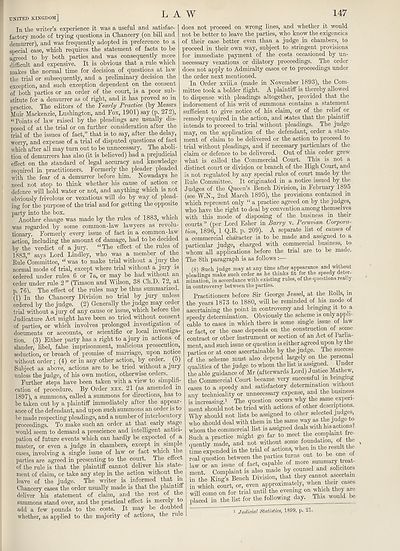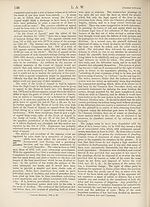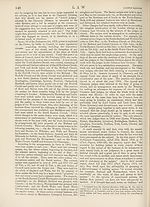New volumes of the Encyclopædia Britannica > Volume 30, K-MOR
(171) Page 147
Download files
Complete book:
Individual page:
Thumbnail gallery: Grid view | List view

UNITED KINGDOM]
LAW
147
In the writer’s experience it was a useful and satisfac-
factory mode of trying questions in Chancery (on bill and
demurrer), and was frequently adopted in preference to a
special case, which requires the statement of facts to be
agreed to by both parties and was consequently more
difficult and expensive. It is obvious that a rule which
makes the normal time for decision of questions at law
the trial or subsequently, and a preliminary decision the
exception, and such exception dependent on the consent
of both parties or an order of the court, is a poor sub¬
stitute for a demurrer as of right, and it has proved so in
practice. The editors of the Yearly Practice (by Messrs
Muir Mackenzie, Lushington, and Fox, 1901) say (p. 272),
“Points of law raised by the pleadings are usually dis¬
posed of at the trial or on further consideration after the
trial of the issues of fact,” that is to say, after the delay,
worry, and expense of a trial of disputed questions of fact
which after all may turn out to be unnecessary. The aboli¬
tion of demurrers has also (it is believed) had a prejudicial
effect on the standard of legal accuracy and knowledge
required in practitioners. Formerly the pleader pleaded
with the fear of a demurrer before him. Nowadays he
need not stop to think whether his cause of action or
defence will hold water or not, and anything which is not
obviously frivolous or vexatious will do by way of plead¬
ing for the purpose of the trial and for getting the opposite
party into the box.
Another change was made by the rules of 1883, which
was regarded by some common-law lawyers as revolu¬
tionary. Formerly every issue of fact in a common-law
action, including the amount of damage, had to be decided
by the verdict of a jury. “ The effect of the rules of
1883,” says Lord Lindley, who was a member of the
Rule Committee, “was to make trial without a jury the
normal mode of trial, except where trial without a jury is
ordered under rules 6 or 7a, or may be had without an
order under rule 2 ” (Timson and \A ilson, 38 Ch.D. 72, at
p. 76). The effect of the rules may be thus summarized.
(1) In the Chancery Division no trial by jury unless
ordered by the judge. (2) Generally the judge may oidei
trial without a jury of any cause or issue, which before the
Judicature Act might have been so tried without consent
of parties, or which involves prolonged investigation of
documents or accounts, or scientific or local investiga¬
tion. (3) Either party has a right to a jury in actions of
slander, libel, false imprisonment, malicious prosecution,
seduction, or breach of promise of marriage, upon notice
without order; (4) or in any other action, by order. . (5)
Subject as above, actions are to be tried without a jury
unless the judge, of his own motion, otherwise oiders.
Further steps have been taken with a view to simplifi¬
cation of procedure. By Order xxx. 21 (as amended in
1897), a summons, called a summons for directions, has to
be taken out by a plaintiff immediately after the appear¬
ance of the defendant, and upon such summons an order is to
he made respecting pleadings, and a number of interlocutory
proceedings. To make such an order at that early stage
would seem to demand a prescience and intelligent antici¬
pation of future events which can hardly be expected, of a
master, or even a judge in chambers, except in. simple
cases, involving a single issue of law or fact which the
parties are agreed in presenting to the court. The effect
of the rule is that the plaintiff cannot deliver his state¬
ment of claim, or take any step in the action without the
leave of the judge. The writer is informed that m
Chancery cases the order usually made is that the plaintiff
deliver his statement of claim, and the rest of t le
summons stand over, and the practical effect is merely to
add a few pounds to the costs. It may be doubted
whether, as applied to the majority of actions, the ru e
does not proceed on wrong lines, and whether it would
not be better to leave the parties, who know the exigencies
of their case better even than a judge in chambers, to
proceed in their own way, subject to stringent provisions
for immediate payment of the costs occasioned by un¬
necessary vexatious or dilatory proceedings. The order
does not apply to Admiralty cases or to proceedings under
the order next mentioned.
In Order xviii.a (made in November 1893), the Com¬
mittee took a bolder flight. A plaintiff is thereby allowed
to dispense with pleadings altogether, provided that the
indorsement of his writ of summons contains a statement
sufficient to give notice of his claim, or of the relief or
remedy required in the action, and states that the plaintiff
intends to proceed to trial without pleadings. The judge
may, on the application of the defendant, order a state¬
ment of claim to be delivered or the action to proceed to
trial without pleadings, and if necessary particulars of the
claim or defence to be delivered. Out of this order grev
what is called the Commercial Court. This is not a
distinct court or division or branch of the High Court, and
is not regulated by any special rules of court made by the
Rule Committee. It originated in a notice issued by the
Judges of the Queen’s Bench Division, in February 1895
(see W.N., 2nd March 1895), the provisions contained in
which represent only “ a practice agreed on by the judges,
who have the right to deal by convention among themselves
with this mode of disposing of the business in their
courts” (per Lord Esher in Barry v. Peruvian Corpora¬
tion, 1896, 1 Q.B. p. 209). A separate list of causes of
a commercial character is to be made and assigned to a
particular judge, charged with commercial business, to
whom all applications before the trial are to be made.
The 8th paragraph is as follows :—
(8) Such fudge may at any time after appearance and without
pleadings make such order as he thinks lit for the speedy deter¬
mination, in accordance with existing rules, of the questions rea }
in controversy between the parties.
Practitioners before Sir George Jessel, at the Rolls, in
the years 1873 to 1880, will be reminded of his mode ol
ascertaining the point in controversy and bringing it to a
speedy determination. Obviously the scheme is only app i-
cable to cases in which there is some single issue of law
or fact, or the case depends on the construction of some
contract or other instrument or section of an Act of Parlia¬
ment, and such issue or question is either agreed upon by the
parties or at once ascertainable by the judge. The success
of the scheme must also depend largely on the personal
qualities of the judge to whom the list is assigned. Under
the able guidance of Mr (afterwards Lord) Justice Mathew,
the Commercial Court became very successful m bringing
cases to a speedy and satisfactory determination without
any technicality or unnecessary expense, and the business
is increasino-.1 The question occurs why the same experi¬
ment should not be tried with actions of other descriptions.
Why should not lists be assigned to other selected judges,
who should deal with them in the same way as the judge to
whom the commercial list is assigned deals with his actions.
Such a practice might go far to meet the complaint fre¬
quently made, and not without some foundation, of the ^
time expended in the trial of actions, when m the result the
real question between the parties turns out to be one of
law or an issue of fact, capable of more summary treat¬
ment. Complaint is also made by counsel and solicitors
in the King’s Bench Division, that they cannot ascertain
In which court, or, even approximately, when their cases
will come on for trial until the evening on which they are
placed in the list for the following day. This would be
1 Judicial Statistics, 1899, p. 21.
LAW
147
In the writer’s experience it was a useful and satisfac-
factory mode of trying questions in Chancery (on bill and
demurrer), and was frequently adopted in preference to a
special case, which requires the statement of facts to be
agreed to by both parties and was consequently more
difficult and expensive. It is obvious that a rule which
makes the normal time for decision of questions at law
the trial or subsequently, and a preliminary decision the
exception, and such exception dependent on the consent
of both parties or an order of the court, is a poor sub¬
stitute for a demurrer as of right, and it has proved so in
practice. The editors of the Yearly Practice (by Messrs
Muir Mackenzie, Lushington, and Fox, 1901) say (p. 272),
“Points of law raised by the pleadings are usually dis¬
posed of at the trial or on further consideration after the
trial of the issues of fact,” that is to say, after the delay,
worry, and expense of a trial of disputed questions of fact
which after all may turn out to be unnecessary. The aboli¬
tion of demurrers has also (it is believed) had a prejudicial
effect on the standard of legal accuracy and knowledge
required in practitioners. Formerly the pleader pleaded
with the fear of a demurrer before him. Nowadays he
need not stop to think whether his cause of action or
defence will hold water or not, and anything which is not
obviously frivolous or vexatious will do by way of plead¬
ing for the purpose of the trial and for getting the opposite
party into the box.
Another change was made by the rules of 1883, which
was regarded by some common-law lawyers as revolu¬
tionary. Formerly every issue of fact in a common-law
action, including the amount of damage, had to be decided
by the verdict of a jury. “ The effect of the rules of
1883,” says Lord Lindley, who was a member of the
Rule Committee, “was to make trial without a jury the
normal mode of trial, except where trial without a jury is
ordered under rules 6 or 7a, or may be had without an
order under rule 2 ” (Timson and \A ilson, 38 Ch.D. 72, at
p. 76). The effect of the rules may be thus summarized.
(1) In the Chancery Division no trial by jury unless
ordered by the judge. (2) Generally the judge may oidei
trial without a jury of any cause or issue, which before the
Judicature Act might have been so tried without consent
of parties, or which involves prolonged investigation of
documents or accounts, or scientific or local investiga¬
tion. (3) Either party has a right to a jury in actions of
slander, libel, false imprisonment, malicious prosecution,
seduction, or breach of promise of marriage, upon notice
without order; (4) or in any other action, by order. . (5)
Subject as above, actions are to be tried without a jury
unless the judge, of his own motion, otherwise oiders.
Further steps have been taken with a view to simplifi¬
cation of procedure. By Order xxx. 21 (as amended in
1897), a summons, called a summons for directions, has to
be taken out by a plaintiff immediately after the appear¬
ance of the defendant, and upon such summons an order is to
he made respecting pleadings, and a number of interlocutory
proceedings. To make such an order at that early stage
would seem to demand a prescience and intelligent antici¬
pation of future events which can hardly be expected, of a
master, or even a judge in chambers, except in. simple
cases, involving a single issue of law or fact which the
parties are agreed in presenting to the court. The effect
of the rule is that the plaintiff cannot deliver his state¬
ment of claim, or take any step in the action without the
leave of the judge. The writer is informed that m
Chancery cases the order usually made is that the plaintiff
deliver his statement of claim, and the rest of t le
summons stand over, and the practical effect is merely to
add a few pounds to the costs. It may be doubted
whether, as applied to the majority of actions, the ru e
does not proceed on wrong lines, and whether it would
not be better to leave the parties, who know the exigencies
of their case better even than a judge in chambers, to
proceed in their own way, subject to stringent provisions
for immediate payment of the costs occasioned by un¬
necessary vexatious or dilatory proceedings. The order
does not apply to Admiralty cases or to proceedings under
the order next mentioned.
In Order xviii.a (made in November 1893), the Com¬
mittee took a bolder flight. A plaintiff is thereby allowed
to dispense with pleadings altogether, provided that the
indorsement of his writ of summons contains a statement
sufficient to give notice of his claim, or of the relief or
remedy required in the action, and states that the plaintiff
intends to proceed to trial without pleadings. The judge
may, on the application of the defendant, order a state¬
ment of claim to be delivered or the action to proceed to
trial without pleadings, and if necessary particulars of the
claim or defence to be delivered. Out of this order grev
what is called the Commercial Court. This is not a
distinct court or division or branch of the High Court, and
is not regulated by any special rules of court made by the
Rule Committee. It originated in a notice issued by the
Judges of the Queen’s Bench Division, in February 1895
(see W.N., 2nd March 1895), the provisions contained in
which represent only “ a practice agreed on by the judges,
who have the right to deal by convention among themselves
with this mode of disposing of the business in their
courts” (per Lord Esher in Barry v. Peruvian Corpora¬
tion, 1896, 1 Q.B. p. 209). A separate list of causes of
a commercial character is to be made and assigned to a
particular judge, charged with commercial business, to
whom all applications before the trial are to be made.
The 8th paragraph is as follows :—
(8) Such fudge may at any time after appearance and without
pleadings make such order as he thinks lit for the speedy deter¬
mination, in accordance with existing rules, of the questions rea }
in controversy between the parties.
Practitioners before Sir George Jessel, at the Rolls, in
the years 1873 to 1880, will be reminded of his mode ol
ascertaining the point in controversy and bringing it to a
speedy determination. Obviously the scheme is only app i-
cable to cases in which there is some single issue of law
or fact, or the case depends on the construction of some
contract or other instrument or section of an Act of Parlia¬
ment, and such issue or question is either agreed upon by the
parties or at once ascertainable by the judge. The success
of the scheme must also depend largely on the personal
qualities of the judge to whom the list is assigned. Under
the able guidance of Mr (afterwards Lord) Justice Mathew,
the Commercial Court became very successful m bringing
cases to a speedy and satisfactory determination without
any technicality or unnecessary expense, and the business
is increasino-.1 The question occurs why the same experi¬
ment should not be tried with actions of other descriptions.
Why should not lists be assigned to other selected judges,
who should deal with them in the same way as the judge to
whom the commercial list is assigned deals with his actions.
Such a practice might go far to meet the complaint fre¬
quently made, and not without some foundation, of the ^
time expended in the trial of actions, when m the result the
real question between the parties turns out to be one of
law or an issue of fact, capable of more summary treat¬
ment. Complaint is also made by counsel and solicitors
in the King’s Bench Division, that they cannot ascertain
In which court, or, even approximately, when their cases
will come on for trial until the evening on which they are
placed in the list for the following day. This would be
1 Judicial Statistics, 1899, p. 21.
Set display mode to:
![]() Universal Viewer |
Universal Viewer | ![]() Mirador |
Large image | Transcription
Mirador |
Large image | Transcription
Images and transcriptions on this page, including medium image downloads, may be used under the Creative Commons Attribution 4.0 International Licence unless otherwise stated. ![]()
| Encyclopaedia Britannica > New volumes of the Encyclopædia Britannica > Volume 30, K-MOR > (171) Page 147 |
|---|
| Permanent URL | https://digital.nls.uk/193569724 |
|---|
| Attribution and copyright: |
|
|---|---|
| Shelfmark | EB.18 |
|---|---|
| Description | Ten editions of 'Encyclopaedia Britannica', issued from 1768-1903, in 231 volumes. Originally issued in 100 weekly parts (3 volumes) between 1768 and 1771 by publishers: Colin Macfarquhar and Andrew Bell (Edinburgh); editor: William Smellie: engraver: Andrew Bell. Expanded editions in the 19th century featured more volumes and contributions from leading experts in their fields. Managed and published in Edinburgh up to the 9th edition (25 volumes, from 1875-1889); the 10th edition (1902-1903) re-issued the 9th edition, with 11 supplementary volumes. |
|---|---|
| Additional NLS resources: |
|

